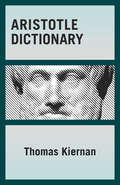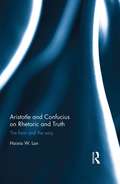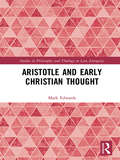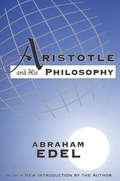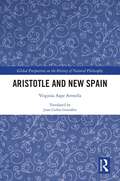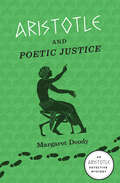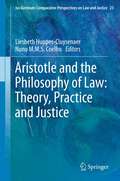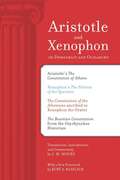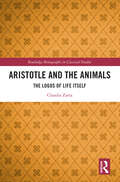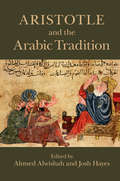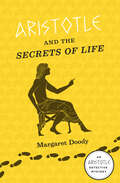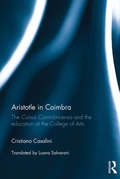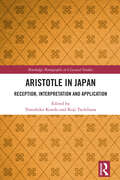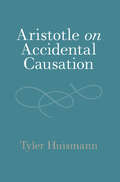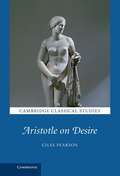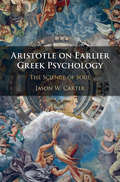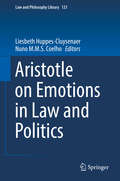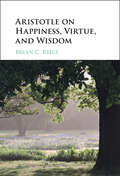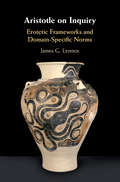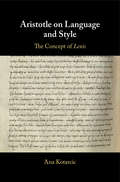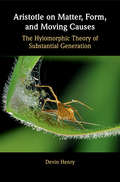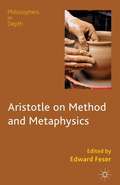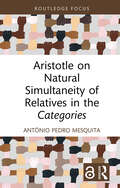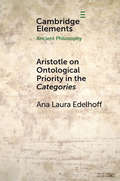- Table View
- List View
Aristotle Dictionary
by Thomas KiernanAt long last, a comprehensive tool in English for a better understanding of the most basic terms in Aristotle&’s philosophy. Interested readers, students, and scholars of philosophy and of the general intellectual background of Western culture need no longer be handicapped by a lack of knowledge of Greek and Latin. A careful comparison of the original Greek, Medieval, and Renaissance Latin translations and a reappraisal of English usage make Aristotle Dictionary a definitive source for the precise grasp of what has been the historical Aristotle as far as the documents permit one to judge. A lengthy introduction by Professor Theodore E. James presents an analysis of the major works of Aristotle.
Aristotle and Confucius on Rhetoric and Truth: The Form and the Way
by Haixia LanThe current study argues that different cultures can coexist better today if we focus not only on what separates them but also on what connects them. To do so, the author discusses how both Aristotle and Confucius see rhetoric as a mode of thinking that is indispensable to the human understanding of the truths of things or dao-the-way, or, how both see the human understanding of the truths of things or dao-the-way as necessarily communal, open-ended, and discursive. Based on this similarity, the author aims to develop a more nuanced understanding of differences to help foster better cross-cultural communication. In making the argument, she critically examines two stereotyped views: that Aristotle’s concept of essence or truth is too static to be relevant to the rhetorical focus on the realm of human affairs and that Confucius’ concept of dao-the-way is too decentered to be compatible with the inferential/discursive thinking. In addition, the author relies primarily on the interpretations of the Analects by two 20th-century Chinese Confucians to supplement the overreliance on renderings of the Analects in recent comparative rhetorical scholarship. The study shows that we need an in-depth understanding of both the other and the self to comprehend the relation between the two.
Aristotle and Early Christian Thought (Studies in Philosophy and Theology in Late Antiquity)
by Mark EdwardsIn studies of early Christian thought, ‘philosophy’ is often a synonym for ‘Platonism’, or at most for ‘Platonism and Stoicism’. Nevertheless, it was Aristotle who, from the sixth century AD to the Italian Renaissance, was the dominant Greek voice in Christian, Muslim and Jewish philosophy. Aristotle and Early Christian Thought is the first book in English to give a synoptic account of the slow appropriation of Aristotelian thought in the Christian world from the second to the sixth century. Concentrating on the great theological topics – creation, the soul, the Trinity, and Christology – it makes full use of modern scholarship on the Peripatetic tradition after Aristotle, explaining the significance of Neoplatonism as a mediator of Aristotelian logic. While stressing the fidelity of Christian thinkers to biblical presuppositions which were not shared by the Greek schools, it also describes their attempts to overcome the pagan objections to biblical teachings by a consistent use of Aristotelian principles, and it follows their application of these principles to matters which lay outside the purview of Aristotle himself. This volume offers a valuable study not only for students of Christian theology in its formative years, but also for anyone seeking an introduction to the thought of Aristotle and its developments in Late Antiquity.
Aristotle and His Philosophy
by Abraham EdelIn this stunning act of synthesis, Abraham Edel captures the entire range of Aristotle's thought in a manner that will prove attractive and convincing to a contemporary audience. Many philosophers approach Aristotle with their own, rather than his, questions. Some cast him as a partisan of a contemporary school. Even the neutral approach of classical scholarship often takes for granted questions that reflect our modern ways of dissecting the world.Aristotle and His Philosophy shows him at work in asking and answering questions. Abraham Edel fashions a sound comparative way of using current analysis to deepen our understanding of Aristotle rather than argue with or simply appropriate him. Edel examines how Aristotle's basic ideas operated in his scientific and humanistic works, what they enabled him to do, what they kept him from doing, and what in turn we can learn from his philosophical experimentation.The purpose of this volume is twofold: to provide a comprehensive introduction to Aristotle's thought, and to throw fresh light on its patterned and systematic character. First, tracing the pattern in Aristotle's metaphysical and physical writings, he then explores the psychology, epistemology, ethics and politics, rhetoric and poetics. In the process, Edel discusses the way interpretations of Aristotle are built up and how different philosophical outlooks Catholic, Hegelian, Marxian, linguistic, naturalistic, and pragmatic have affected the reading of Aristotelian texts and ideas.The new introduction probes the general problem of interpreting a philosophy, and suggests how working through the different interpretations can contribute to a fuller understanding. This methodological self-consciousness makes Aristotle and His Philosophy markedly different from other studies of Aristotle. Martha C. Nussbaum of Brown University has described Edel as having "philosophical sensitivity and good sense throughout. His scholarship is comprehensive, but handled with grace and clarity."
Aristotle and New Spain (Global Perspectives on the History of Natural Philosophy)
by Virginia Aspe ArmellaThis book is a detailed exploration of the Hispanic intellectual context and the different Aristotelian traditions that prevailed until the 16th century. Through a review and contextualisation of Aristotelian thinkers and texts, it argues that a unique Aristotelian tradition was formed in New Spain.The characteristic differences of Novohispanic Aristotelianism are a consequence of five factors: contact with the autochthonous cultures of America, the impact of the colonial organisation, the influence of the Salamanca humanist tradition, the presence of the Italian Aristotelianism of Renaissance translators in the university curricula and in the intellectual polemics of the time, and a peculiar assimilation of primitive and Old Testament Christianity in relation to indigenous people. This book analyses the works of Alonso de la Veracruz, Bartolomé de las Casas, Bernardino de Sahagún, Sor Juana Inés de la Cruz, Carlos de Sigüenza y Góngora, and Francisco Xavier Clavijero, reconsidering them in light of the history of ideas in New Spain and the contributions of Byzantine translators. It also offers a reflection on the problem of addressing Mexican colonial sources.This volume will be of interest to undergraduate and postgraduate philosophy students, as well as to researchers focused on Aristotle, Renaissance philosophy, or Latin American studies.
Aristotle and Poetic Justice: An Aristotle Detective Novel (The Aristotle Detective Novels #2)
by Margaret DoodyThe great Greek philosopher heads to Delphi on the hunt for a kidnapped heiress in this series of &“witty, elegant whodunits&” (Times Literary Supplement). 330BC: Alexander the Great has sacked Persepolis and won the greatest fortune the world has ever known. The night of the Silent Dinner, when Athens placates the spirits of the dead, passes with a creeping mist accompanied by eerie portents and a strange disappearance. Stephanos and his teacher, the philosopher Aristotle, are about to be drawn into solving the perplexing abduction case of Anthia, the heiress of a prominent silver merchant. All that is known is that the abductor and the heiress are on the road to Delphi and its ancient oracle—whose help may be needed when a murder complicates the case in this follow-up to the &“eminently enjoyable&” Aristotle Detective (Colin Dexter, author of the Inspector Morse Mysteries). &“Why did no one think of this before?&”—The Times (UK)
Aristotle and The Philosophy of Law: Theory, Practice And Justice (Ius Gentium: Comparative Perspectives on Law and Justice #23)
by Nuno M.M.S. Coelho Liesbeth Huppes-CluysenaerThe book presents a new focus on the legal philosophical texts of Aristotle, which offers a much richer frame for the understanding of practical thought, legal reasoning and political experience. It allows understanding how human beings interact in a complex world, and how extensive the complexity is which results from humans' own power of self-construction and autonomy. The Aristotelian approach recognizes the limits of rationality and the inevitable and constitutive contingency in Law. All this offers a helpful instrument to understand the changes globalisation imposes to legal experience today. The contributions in this collection do not merely pay attention to private virtues, but focus primarily on public virtues. They deal with the fact that law is dependent on political power and that a person can never be sure about the facts of a case or about the right way to act. They explore the assumption that a detailed knowledge of Aristotle's epistemology is necessary, because of the direct connection between Enlightened reasoning and legal positivism. They pay attention to the concept of proportionality, which can be seen as a precondition to discuss liberalism.
Aristotle and Xenophon On Democracy and Oligarchy
by J. M. MooreThis collection contains: Aristotle's "The Constitution of Athens"; Xenophon's "The Politeia of the Spartans"; "The Constitution of the Athenians" ascribed to Xenophon the Orator; and, "The Boeotian Constitution" from the Oxyrhynchus Historian. In bringing together, translating, and annotating these constitutional documents from ancient Greece thirty-five years ago, J.M. Moore produced an authoritative work of the highest scholarship. There is an explanatory essay by classics scholar Kurt A. Raaflaub that expands this indispensable collection.
Aristotle and the Animals: The Logos of Life Itself (Routledge Monographs in Classical Studies)
by Claudia ZattaWith a novel approach to Aristotle’s zoology, this study looks at animals as creatures of nature (physis) and reveals a scientific discourse that, in response to his predecessors, exiles logos as reason and pursues the logos intrinsic to animals’ bodies, empowering them to sense the world and live. The volume explores Aristotle’s conception of animals through a discussion of his ad hoc methodology to study them, including the pertinence of the soul to such a study, and the rise of zoology as a branch of natural philosophy. For Aristotle, animal life stems from the body in the space of existence and revolves around sensation, which is entwined with pleasure, pain, and desire. Lack of human reason is irrelevant to an understanding of the richness of animal life and cognition. In sum, the reader will acquire knowledge of the "animal as such," which lay at the core of Aristotle’s agenda and required a study of its own, separate from plants and the elements. This book is intended for students of the history of science, ancient biology, and philosophy and all those who, from different fields, are interested in animal studies and the human-animal relation.
Aristotle and the Arabic Tradition
by Ahmed Alwishah Josh HayesThis volume of essays by scholars in ancient Greek, medieval, and Arabic philosophy examines the full range of Aristotle's influence upon the Arabic tradition. It explores central themes from Aristotle's corpus, including logic, rhetoric and poetics, physics and meteorology, psychology, metaphysics, ethics and politics, and examines how these themes are investigated and developed by Arabic philosophers including al-Kindî, al-Fârâbî, Avicenna, al-Ghazâlî, Ibn Bâjja and Averroes. The volume also includes essays which explicitly focus upon the historical reception of Aristotle, from the time of the Greek and Syriac transmission of his texts into the Islamic world to the period of their integration and assimilation into Arabic philosophy. This rich and wide-ranging collection will appeal to all those who are interested in the themes, development and context of Aristotle's enduring legacy within the Arabic tradition.
Aristotle and the Secrets of Life: An Aristotle Detective Novel (The Aristotle Detective Novels #3)
by Margaret DoodyThe great philosopher and his student face pirates, political intrigue, and more in this dark, suspenseful mystery set in ancient Athens. Tensions between the Athenians and the Makedonians—whose leader, Alexander the Great, is one of Aristotle&’s former students—draw the philosopher across the Aegean Sea, accompanied by the devoted Stephanos. Both will have much to learn about survival as they find themselves beset by pirates, uncovering conspiracy, and facing the horrors of war. It will be up to Aristotle to try to shed light on the darkness they are about to encounter—in this novel in the historical series praised as &“unusually authentic&” (Kirkus Reviews) and &“eminently enjoyable&” (Colin Dexter, author of the Inspector Morse Mysteries). Also published as Aristotle and the Mystery of Life
Aristotle in Coimbra: The Cursus Conimbricensis and the education at the College of Arts
by Cristiano CasaliniAristotle in Coimbra is the first book to cover the history of both the College of Arts in Coimbra and its most remarkable cultural product, the Cursus Conimbricensis, examining early Jesuit pedagogy as performed in one of the most important colleges run by the Society of Jesus in the sixteenth century. The first complete philosophical textbook published by a Jesuit college, the Cursus Conimbricensis (1592–1606) was created by some of the most renowned early Jesuit philosophers and comprised seven volumes of commentaries and disputations on Aristotle’s writings, which had formed the foundation of the university philosophy curriculum since the Middle Ages. In Aristotle in Coimbra, Cristiano Casalini demonstrates the connection between educational practices in a sixteenth-century college and the structure of a scholastic philosophical commentary, providing insight into this particular form of late-scholastic Aristotelianism through historiographical discourse. This book provides both a narrative of the historical background behind the publication of the Cursus and an analysis of the major philosophical and educational issues addressed by its seven volumes. It is valuable reading for all those interested in intellectual history, the history of education and the history of philosophy.
Aristotle in Japan: Reception, Interpretation and Application (Routledge Monographs in Classical Studies)
by Koji Tachibana Tomohiko KondoThis is the first volume to explore the modern reception and contemporary relevance of Aristotle and his philosophy in Japan, making it a valuable contribution to both global Aristotelian studies and studies of Japanese philosophical traditions.The study of Aristotle’s philosophy in Japan is already over a hundred years old, yet the fruits of these efforts have mostly been published in Japanese and thus circulated almost entirely within Japan. Japanese scholarship, however, has not been conducted in isolation but rather has developed by keeping up with crucial contemporary trends in international scholarship. Aristotelian studies in Japan have therefore been neither particularly Japanese nor Far East Asian at first glance, which is one reason why they have not received much attention in Japanese philosophical literature. This volume addresses this gap, exploring the long historical struggle of Japanese people to read, understand and adopt Aristotle’s philosophy in a philosophical tradition different from the West. It also examines the applicability of Aristotle’s philosophy to contemporary issues and demonstrates the extent to which his philosophy remains relevant today, whether in the East or West.Aristotle in Japan: Reception, Interpretation and Application is of interest to students and scholars of Aristotelian philosophy, as well as those working on Japanese philosophy and classical reception.
Aristotle on Accidental Causation
by Tyler HuismannIn this major new study, Tyler Huismann connects Aristotle's natural philosophy to modern theories of causation and provides fresh interpretations of classic issues. He links two of the most important notions in Aristotle's philosophy, accidents and causes, and using the concept of accidental causation as a guide, argues for ground-breaking proposals on some of the most foundational areas of Aristotle's thought: the relation between substances and accidents, the nature of efficient causation, the workings of 'qua,' the possibility of uncaused events, and the role of accidental causation in the natural world. Structured around close readings of Aristotle's Physics and Metaphysics and informed by contemporary theories of causation, Huismann's book offers students an accessible treatment of some of Aristotle's core texts, and provides specialists with a series of provocative interpretations.
Aristotle on Desire
by Giles PearsonDesire is a central concept in Aristotle's ethical and psychological works, but he does not provide us with a systematic treatment of the notion itself. This book reconstructs the account of desire latent in his various scattered remarks on the subject and analyses its role in his moral psychology. Topics include: the range of states that Aristotle counts as desires (orexeis); objects of desire (orekta) and the relation between desires and envisaging prospects; desire and the good; Aristotle's three species of desire: epithumia (pleasure-based desire), thumos (retaliatory desire) and boulêsis (good-based desire – in a narrower notion of 'good' than that which connects desire more generally to the good); Aristotle's division of desires into rational and non-rational; Aristotle and some current views on desire; and the role of desire in Aristotle's moral psychology. The book will be of relevance to anyone interested in Aristotle's ethics or psychology.
Aristotle on Earlier Greek Psychology: The Science of Soul
by Jason W. CarterThis volume is the first in English to provide a full, systematic investigation into Aristotle's criticisms of earlier Greek theories of the soul from the perspective of his theory of scientific explanation. Some interpreters of the De Anima have seen Aristotle's criticisms of Presocratic, Platonic, and other views about the soul as unfair or dialectical, but Jason W. Carter argues that Aristotle's criticisms are in fact a justified attempt to test the adequacy of earlier theories in terms of the theory of scientific knowledge he advances in the Posterior Analytics. Carter proposes a new interpretation of Aristotle's confrontations with earlier psychology, showing how his reception of other Greek philosophers shaped his own hylomorphic psychology and led him to adopt a novel dualist theory of the soul–body relation. His book will be important for students and scholars of Aristotle, ancient Greek psychology, and the history of the mind–body problem.
Aristotle on Emotions in Law and Politics (Law and Philosophy Library #121)
by Nuno M.M.S. Coelho Liesbeth Huppes-CluysenaerIn this book, experts from the fields of law and philosophy explore the works of Aristotle to illuminate the much-debated and fascinating relationship between emotions and justice.<P><P> Emotions matter in connection with democracy and equity – they are relevant to the judicial enforcement of rights, legal argumentation, and decision-making processes in legislative bodies and courts. The decisive role that emotions, feelings and passions play in these processes cannot be ignored – not even by those who believe that emotions have no legitimate place in the public sphere. A growing body of literature on these topics recognizes the seminal insights contributed by Aristotle. This book offers a comprehensive analysis of his thinking in this context, as well as proposals for inspiring dialogues between his works and those written by a selection of modern and contemporary thinkers. As such, the book offers a valuable resource for students of law, philosophy, rhetoric, politics, ethics and history, but also for readers interested in the ongoing debate about legal positivism and the relevance of emotions for legal and political life in today’s world. <P> Explains how Aristotle’s attention to the non-rational elements of cognition contributes to his realistic views on the rule of law, social cohesion, democracy and judgment.<P> Re-appraises Aristotle’s biological view on the continuity between human and animal life.<P> Shows the striking similarity between the views of contemporary neuro-scientists and Aristotle’s thoughts on emotion.<P> Examines many of Aristotle’s writings such as Nicomachean Ethics, Politics, Rhetoric and Metaphysics.<P> Presents the outcomes of several years of interdisciplinary collaboration between ancient philosophy scholars, legal theorists, political scientists and historians
Aristotle on Happiness, Virtue, and Wisdom
by Bryan C. ReeceAristotle thinks that happiness is an activity – it consists in doing something – rather than a feeling. It is the best activity of which humans are capable and is spread out over the course of a life. But what kind of activity is it? Some of his remarks indicate that it is a single best kind of activity, intellectual contemplation. Other evidence suggests that it is an overarching activity that has various virtuous activities, ethical and intellectual, as parts. Numerous interpreters have sharply disagreed about Aristotle's answers to such questions. In this book, Bryan Reece offers a fundamentally new approach to determining what kind of activity Aristotle thinks happiness is, one that challenges widespread assumptions that have until now prevented a dialectically satisfactory interpretation. His approach displays the boldness and systematicity of Aristotle's practical philosophy.
Aristotle on Homonymy
by Julie K. WardJulie K. Ward examines Aristotle's thought regarding how language informs our views of what is real. First she places Aristotle's theory in its historical and philosophical contexts in relation to Plato and Speusippus. Ward then explores Aristotle's theory of language as it is deployed in several works, including Ethics, Topics, Physics, and Metaphysics, so as to consider its relation to dialectical practice and scientific explanation as Aristotle conceived it.
Aristotle on Inquiry: Erotetic Frameworks and Domain-Specific Norms
by James G. LennoxAristotle is a rarity in the history of philosophy and science - he is a towering figure in the history of both disciplines. Moreover, he devoted a great deal of philosophical attention to the nature of scientific knowledge. How then do his philosophical reflections on scientific knowledge impact his actual scientific inquiries? In this book James Lennox sets out to answer this question. He argues that Aristotle has a richly normative view of scientific inquiry, and that those norms are of two kinds: a general, question-guided framework applicable to all scientific inquiries, and domain-specific norms reflecting differences in the target of inquiry and in the means of observation available to researchers. To see these norms of inquiry in action, the second half of this book examines Aristotle's investigations of animals, the soul, material compounds, the motions of heavenly bodies, and respiration.
Aristotle on Language and Style: The Concept of Lexis
by Ana KotarcicThis is the first systematic analysis of Aristotle's concept of lexis. Ana Kotarcic argues that it should be approached on three interconnected levels: the first dealing with language as a system, the second with actual language usage, into which sociolinguistic factors come into play, and the third with prescriptions for the kind of language to be used in poetic and rhetorical compositions. She introduces ideas and concepts from classics and modern linguistics into the analysis alongside the philosophical approaches which have prevailed until now. The results reveal that Aristotle's ideas on lexis are complex, well-developed and intimately connected to many other fundamental concepts in his works, such as aretē, energeia, ēthos, logos, mimēsis, pathos, phantasia and technē. A major component of his thought is therefore illuminated comprehensively for the first time.
Aristotle on Matter, Form, and Moving Causes: The Hylomorphic Theory of Substantial Generation
by Devin HenryThis book examines an important area of Aristotle's philosophy: the generation of substances. While other changes presuppose the existence of a substance (Socrates grows taller), substantial generation results in something genuinely new that did not exist before (Socrates himself). The central argument of this book is that Aristotle defends a 'hylomorphic' model of substantial generation. In its most complete formulation, this model says that substantial generation involves three principles: (1) matter, which is the subject from which the change proceeds; (2) form, which is the end towards which the process advances; and (3) an efficient cause, which directs the process towards that form. By examining the development of this model across Aristotle's works, Devin Henry seeks to deepen our grasp on how the doctrine of hylomorphism - understood as a blueprint for thinking about the world - informs our understanding of the process by which new substances come into being.
Aristotle on Method and Metaphysics
by Edward FeserAristotle on Method and Metaphysics is a collection of new and cutting-edge essays by prominent Aristotle scholars and Aristotelian philosophers on themes in ontology, causation, modality, essentialism, the metaphysics of life, natural theology, and scientific and philosophical methodology.
Aristotle on Natural Simultaneity of Relatives in the Categories (Routledge Focus on Philosophy)
by António Pedro MesquitaThis book addresses the issue of natural simultaneity of relatives, discussed by Aristotle in Categories 7, 7b15– 8a12. Natural simultaneity is a form of symmetrical ontological dependence that holds between items that are not causally linked. In this section of the Categories, Aristotle introduces this topic in his analysis of relatives and maintains that although relatives seem to be for the most part simultaneous by nature, there seem to be some exceptions. He mentions two pairs of relatives as exceptions, namely the pairs knowledge/knowable and perception/perceptible, and argues at length for the priority of the second relative over the first one in each case. Through a close reading of this text, the author analyses Aristotle’s arguments for the thesis of the exceptional character of these pairs and shows that all of them are unsuccessful in supporting the thesis. In order to draw this conclusion, the author highlights and carefully considers the properties that Aristotle is committed to attributing to relatives, taking into account the metaphysical framework of the Categories as well as their specificities within the set of nonsubstantial categories. Then, he shows that Aristotle’s mature views on relatives in the Metaphysics can be construed as committing him to the rejection of such a thesis.Although the issue of natural simultaneity is just one of several that Aristotle considers in his discussion of relatives throughout Categories 7, it is a particularly relevant issue, since it involves a number of puzzles whose analysis allows for a better understanding of the very notion of relativity in Aristotle. This is the first book to explore this issue from the perspective of illuminating the Aristotelian views on relatives.Aristotle on Natural Simultaneity of Relatives in the Categories will appeal to scholars and graduate students working on Aristotle, ancient philosophy in general, and metaphysics.
Aristotle on Ontological Priority in the Categories (Elements in Ancient Philosophy)
by Ana Laura EdelhoffThe main objective of this Element is to reconstruct Aristotle's view on the nature of ontological priority in the Categories. Over the last three decades, investigations into ontological dependence and priority have become a major concern in contemporary metaphysics. Many see Aristotle as the originator of these discussions and, as a consequence, there is considerable interest in his own account of ontological dependence. In light of the renewed interest in Aristotelian metaphysics, it will be worthwhile - both historically and systematically - to return to Aristotle himself and to see how he himself conceived of ontological priority (what he calls 'priority in substance' [proteron kata ousian] or 'priority in nature' [proteron tēi phusei]), which is to be understood as a form of asymmetric ontological dependence.
